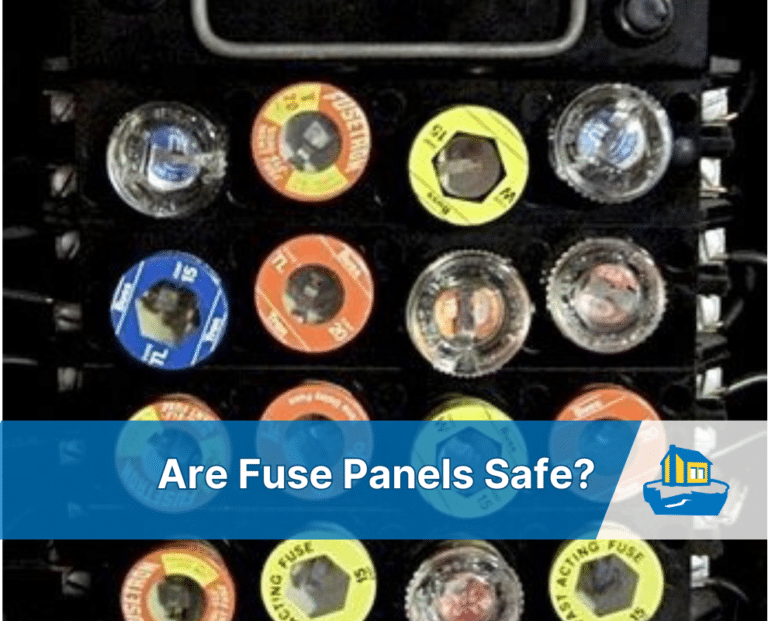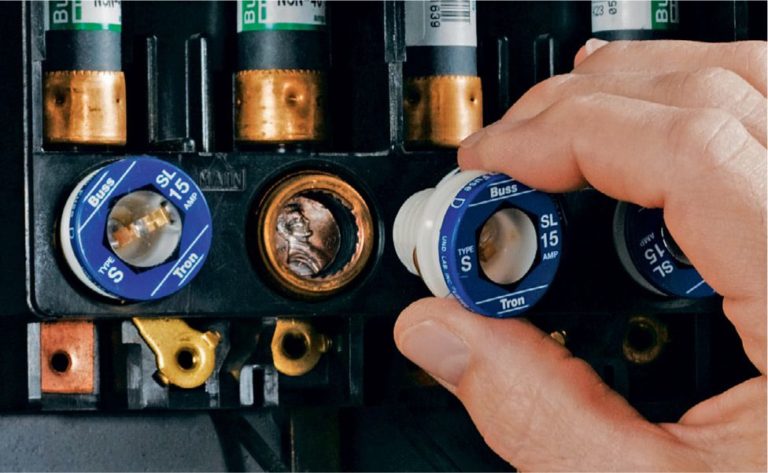4.8 1700+ Google Reviews

If you’re into buying or selling older homes here in the Richmond area, it is only a matter of time before you run into some fuse panels. They may look strange and you may wonder if fuse panels are safe. The short answer is YES, fuse panels are SAFE.
Like any electrical panel, they need an inspection to determine if there are any actual safety issues present.
Fuses, just like breakers, are devices installed in an electrical circuit, usually at the main panel, that protect the wiring and sometimes the electrical equipment from electrical overload. Overload means a wire, or device, has more current flow than it is designed for, creating excessive heat and a fire hazard,
Fuses and breakers stop the flow of electricity during these overloads to prevent electrical fires. For example, a common source of overload is using too many extension cords on a single circuit .
Probably one of the most iconic electrical overloads is Clark Griswald plugging in his Christmas tree lights and frying the cat. Although, that was more of a short circuit as the cat had been chewing on the wires.
A fuse contains a thin metal strip that will melt during overload conditions. The metal that melts away creates a break in the circuit also known as an open circuit, and stops the flow of electricity. As a result, many homeowners and electricians call this a blown fuse.
This actually occurs much faster than a circuit breaker will trip. A fuse can stop flow to a circuit in .002 seconds or less. A breaker can take .1 – .2 seconds meaning it is over 100 times slower.
There are some differences which make fuses less practical and perhaps less safe than breakers, but not UNSAFE.
The biggest problem with fuses is that once a fuse “blows” it is no good and will needs replacement. Although they are readily available at almost any hardware store, this is still an inconvenience for most homeowners.
On the other hand, if a breaker trips, it is easy to reset the breaker and continue use of the circuit without much inconvenience.
That being said, if either continue to trip, an electrical contractor needs to evaluate it.
Another problem with old fuse boxes is that it is easy for homeowners to replace a fuse with similarly shaped metal objects. This allows electricity to flow through the circuit, but offers no protection. A common defect is homeowners placing pennies in the fuse slot.
Some electricians and home inspectors argue that the over fusing is a problem with fuses, but I don’t agree. Over fusing occurs when someone uses a fuse rated for higher than the circuit wiring is used. For example, using a 30-amp fuse on a 15-amp circuit. In this situation, the wiring would burn up before the fuse would blow.
First, it’s just as easy to replace smaller fuses with bigger fuses as it is do it with breakers. The other reason I don’t agree is the invention of S fuses. S fuses and their adapters make fuse panels tamper proof. Each size fuse has different size threads and only fits into its respective base.
So, while over fusing can be an issue, it is not unique to fuses. The same thing happens in modern homes
Many home inspectors make the argument that an older fuse panel is more prone to unprofessional work done inside the panel. I disagree with this as well. Defects caused by DIY fanatics don't exist only in older fuse panels, or even older homes. Modern homes and panels are all subject to defects created by well meaning homeowners and too much HGTV.
In any case, the electrical panel will need to be inspected by the home inspector to determine if there are any bonafide defects.

One of the main differences of fuses is their incompatibility with modern safety enhancements. Modern electrical codes require certain circuits to have GFCI (ground fault circuit interrupter), and/or AFCI (arc fault circuit interrupter) protection. This protection is only available with modern circuit breakers and this is where the fuses are considered less safe.
Although you could provide GFCI protection to a home through the receptacles, this not currently possible for AFCI protection.
Although most homeowners don’t think about electrical components as needing regular maintenance, most circuit breaker manufacturers recommend operating breakers annually. This offers some self lubrication and ensures the breaker will work when you need it to.
Fuses on the other hand are far less prone to failure giving them the upper hand in this category.
Insurance companies are far less likely to issue a policy on a home with fuses and if they do, there is going to be a higher premium. This alone is reason enough to consider upgrading your main electrical panel.
It generally cost about $1500-$2500 to upgrade an electrical panel and depending on the higher premium from an insurance company, it could be very quick to break even on that cost.
If you’re buying an older home with electrical fuses, its not necessarily a red flag, or something to be scared of. If anything, I would be scared of the bill from the insurance company, but not the fuses themselves.
Its undeniable that breakers are an upgrade, but that doesn’t mean you need to be afraid of fuses.
Whether the home as fuses, or breakers, there could be defects inside the electrical panel that can be determined by the home inspector.
Upgrading the panel will give you safety upgrades, and cheaper homeowners insurance which could totally be worth it, but that does not mean that fuses are not safe.